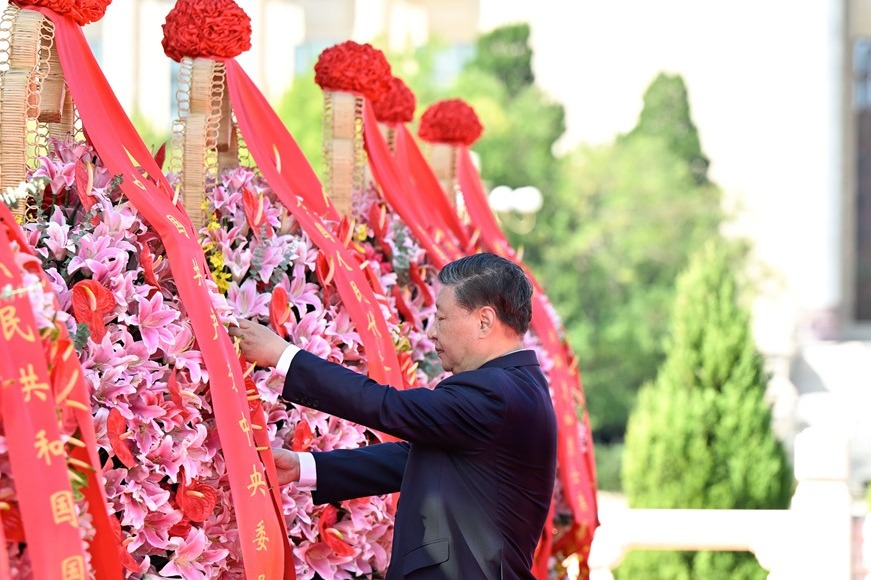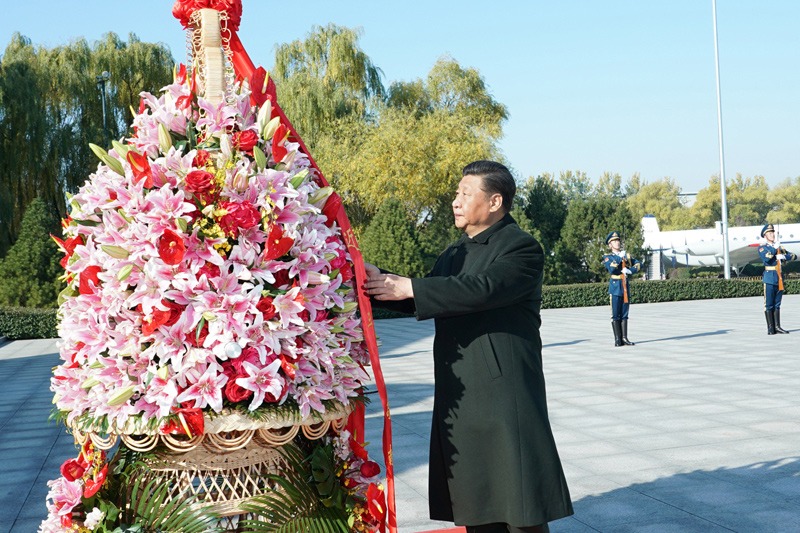Seeing is believing: Global experts visit Xizang

A group consisting of academics and media professionals from various countries, including India, France, Sweden, and South Africa, recently visited Xizang autonomous region in China in May.
They began their visit at Lhasa No 8 Middle School.
"We visited a lot of classrooms where students were doing their work. And we learned that they were learning in the Tibetan language as well as in Mandarin. Usually, you find that in certain countries, minority languages are not respected. But we saw in the schools that we visited that even minority languages are respected in China," said Lloyd Kuveya, assistant director of the Center for Human Rights at the University of Pretoria, South Africa.
Kuveya was also surprised to learn that Xizang has a 15-year publicly funded education system, covering school meals, lodging, and tuition from kindergarten to senior high school, ensuring equal educational opportunities for all children.
On Western media's claims against boarding schools in Xizang, Kwon Ki Sik, president of the Korea-China City Friendship Association, said that such accusations "are unfair and not true". "It's a kind of political attack supported by political power group. Media should write and report the real stories of Chinese ethnic policy and about the people's satisfaction and happy life."
"Students are given training in the traditional language so that they can remain connected to their roots, and at the same time, they are getting the opportunity to learn English and learn new technology," said Gyanendra Kumar Keshri, special correspondent of Indian newspaper Deccan Herald, as he was surprised to see students learning AI technology at school.
With over 2,000 students, about 70 percent of whom are boarders, Lhasa No 8 Middle School provides free accommodation for its resident students, who return home on weekends.
In Xizang, where the population is spread thin and educational resources are dispersed across a vast expanse of land, people have a strong desire to be educated. Over the years, students who have studied in Xizang have made significant contributions to the development of Xizang and the country as a whole.
As the region celebrates the 65th anniversary of democratic reform, it's proud to say that education has become a fundamental right accessible to all.
On the train ride from Lhasa to Shigatze,?foreign experts shared their impression of?Xizang's development.
"It's obvious that the Chinese government is making a huge effort for the infrastructure in Xizang, " said Jean Pregouret, president of Saphir Eurasia Promotion, as he gazed atthe bridge whizzing past outside the window.
"The high-rise buildings with modern facilities and roads, the kind of development on roads that we saw here is really impressive with smart facilities," said Gyanendra Kumar Keshri, Special Correspondent at Deccan Herald.
"All these things are not very common in at least the cities which are located in the Himalayas, from Indian side of cities I have witnessed so many. When you have the will power and proper planning, what is happening in newer areas is really impressive," Keshri added.
"When you read some of the international human rights instruments, the rights to development is actually now a human right," said Lloyd Kuveya, assistant director of the Center for Human Rights at the University of Pretoria, South Africa. Kuveya expressed his surprise at the level of development in Xizang, as he had previously assumed that Xizang would not be as well developed.
The delegation also visited?Guojiaxin village, a relocation site for poverty alleviation with a total of 408 households and 1,843 residents, in Shigatse city.
Most of the villagers in Guojia New Village used to live around 4,500 meters above sea level. With the implementation of the poverty alleviation relocation policy, the villagers now enjoy convenient living conditions at lower altitude and better ecological environment.
"I am thrilled to see such a dramatic transformation in the lives of people," said Alka Acharya, professor at the Centre for East Asian Studies at the Jawaharlal Nehru University's School of International Studies. "It's overwhelming sensation when people open up their homes and their hearts to you and offer you their hospitality," Acharya added.
"It's very apparent that this relocation program has benefited them economically, without a doubt. I'm impressed by how organized the community building is," said Gustaf Lansner, project manager of the Belt and Road Institute in Sweden.
The delegation also visited a local brewery and a dairy factory in Shigatse city.
"I've seen more of inclusion, more of assistance, empowerment, affirmative action in order to speed up the economic development and to improve the lives of ordinary people, which for me, as a human rights lawyer, that's the sort of thing that I would want to see," Lloyd Kuveya, assistant director of the Center for Human Rights at the University of Pretoria, South Africa. "Marginalized and vulnerable groups in society are not being left behind in terms of the development agenda," said Kuveya.
"I think it's a remarkable aspect of the development process that the state and the provincial-level governments are supporting the development of startups of industries to bring in the latest technology, and this can provide employment," said Acharya.
Despite significant improvement in the lives of the people in Xizang, internationally, another version of the Xizang story can still be heard with distorting facts and lies.
"When you have a large part of Western institutions that are choosing not to allow the reality to be perceived, when they deliberately misrepresent the reality, of course, we have a certain responsibility to bring the reality and the truth of the situation forward," said Stephen Brawer, distinguished research fellow from Guangdong Institute for International Strategies and chairman of the Belt and Road Institute in Sweden. "I'm an optimist that step by step, the world will begin to see the truth about Xizang. And the living standard of the people here in Xizang have dramatically improved," added Brawer.
























